|
|
 |
|

IP
Program Launches Creative and Innovative Economy
Center | Government
Contract Event Examines the Defense Authorization
Act | Assessing
the State of Labor Unions | High
Rankings | Scholarship
Supports Procurement Law | Harvey
Pitt Delivers Manuel F. Cohen Memorial Lecture | Weinglass
Speaks on National Security Issues | Jim
Moran in the House | Fun
on the Yard | Three
Win Finnegan Prize | Kovacic
Named FTC Commissioner | In
Recognition of Service | Law
School Expands To Lisner Hall; Food Vendor
Added | Schooner
to be Academic Affairs Dean | Public
Interest Corner | International
Update | GW
Law in History | Faculty
File
International Update
|
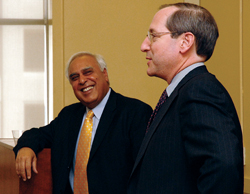
Indian Minister of Science and Technology Kapil Sibal with Dean Frederick
M. Lawrence
Claire Duggan |
Indian Minister of Science and Technology
Visits GW
For three years, GW Law’s India
Project, a major initiative in international
and comparative law, has focused on
intellectual property law in India.
Focus areas include science, technology,
and innovation. In April, the Law School
welcomed Indian Minister of Science
and Technology Kapil Sibal, who addressed
students and faculty on a range of
issues from judicial review and constitutionalism
in India to the recent U.S.-India agreement
on nuclear technology.
|
|
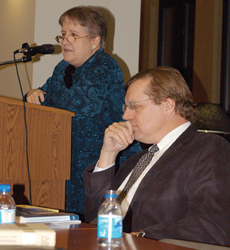
Johns Hopkins professor Ruth Wedgwood and former U.S. Ambassador at Large
for War Crimes David Scheffer, now a professor at Northwestern University
Law School, participate in a panel on the United States and the International
Criminal Court in The Hague.
Claire Duggan
|

|
International Law Week Draws Faculty
Experts
The International Law Society, one of
the Law School’s largest and most
active student groups, hosted International
Law Week this spring. Events included
panels on substantive legal issues as
well as a session on careers in international
law. One of the opening events was a
panel examining the difficult relationship
between the United States and the International
Criminal Court in The Hague. The week
ended with a reception at the Embassy
of Australia. |
|
|
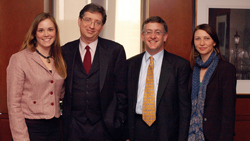
Human Rights Law Society members 3L Heather Carney (left) and Rita Siemion,
JD ’06, with Professor Ralph G. Steinhardt (second from left) and
luncheon speaker Eric Biel, deputy director of Human Rights First |
Students Sponsor Conference on Poverty
and Human Rights
In February, GW Law student groups sponsored
a two-day Conference on Poverty and Human
Rights. Students, faculty members, practitioners,
and advocates participated in panels
including “Bullets, Starvation,
and the Limits of Law: An Update on Sudan” and “Does
Corporate Law Have Anything to Do with
Poverty Reduction?” A film series
also was part of the event.
|
|
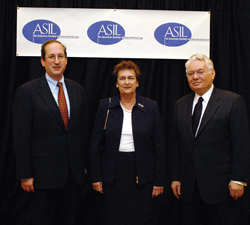
Dean Frederick M. Lawrence, ICJ President Rosalyn Higgins, and
ICJ Judge and Professor Emeritus Thomas Buergenthal at the ASIL Centennial
meeting.
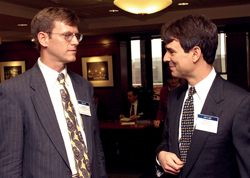
(Above) Professor Sean Murphy and U.S. State Department
Legal Adviser John B. Bellinger.
Claire Duggan
|

|
Visitors Give Insight Into International Courts and Tribunals
International Court of Justice Judge
and Professor Emeritus Thomas Buergenthal
visited the Law School in March to discuss
the growing docket of cases at the ICJ.
Later that month, ICJ President Rosalyn
Higgins presented a keynote address at
the American Society of International
Law’s Centennial Annual Meeting;
Higgins and Buergenthal were introduced
at the event by Dean Frederick M. Lawrence.
In May, U.S. Department of State Legal
Adviser John B. Bellinger gave the keynote
address at a conference on the United
States’ relationship with international
courts and tribunals held at the Law
School and co-sponsored by New York University’s
Center on International Cooperation.
In addition to several panels and addresses,
the conference unveiled a landmark poll
by World Public Opinion on American attitudes
toward international tribunals. |
|
Events Focus on China
|

Professor Donald Clarke,
NYU Law Professor Jerome
Cohen, Judge
Hui-Fang Huang, LLM ’06,
and guest discuss Chinese
legal reform after Cohen's
enrichment lecture.
Claire Duggan |
| |
|
In the spring, three events put China
in the spotlight at GW Law. In March,
the East Asian Law Students Association
hosted Simon Luk, partner and chairman
at Heller Ehrman’s Hong Kong
office. Luk discussed private equity
in China and examined recent changes
in Chinese law on raising capital.
In April, New York University Law Professor
Jerome Cohen was the featured speaker
at an Enrichment Lecture Series event
on Chinese legal reform. And, as part
of the Law School’s International
Law Colloquium, American University
Washington College of Law Professor
Teemu Ruskola presented “American
Legal Imperialism in China: From the
Opium War to the WTO” in April.
|
The Legacy of Louis B. Sohn
Professor Louis B. Sohn, a prominent international
law scholar who helped draft the United Nations
charter and who fostered awareness and action
in human rights, passed away June 7 in Falls
Church, Va. He was 92. In addition to serving
the GW Law community, he taught at Harvard
University and the University of Georgia; several
of his students went on to become ambassadors
to the UN.
Born in Ukraine, Sohn came to the United States
from Poland shortly before the Nazi invasion.
Among his many accomplishments, Sohn worked
on the 1972 Stockholm Conference on the Human
Environment and helped establish the U.S. Arms
Control and Disarmament Agency. He was instrumental
in the formation of the Law of the Sea Convention
and the Law of the Sea Tribunal, strongly advocating
international dispute settlement. Sohn was
a member of the U.S. Institute of Peace, served
as chairman of the international law section
of the American Bar Association, and was a
past president of the American Society of International
Law. In 2003, Sohn was the inaugural recipient
of the International Environmental Law Award
from the Center for International Environmental
Law.
Sohn is survived by his wife of 65 years, Betty
Mayo Sohn.
“Generations of international lawyers
have stood on the shoulders of this gigantic
small man,” says Professor Ralph Steinhardt. “He
was in many ways the dean of what Oscar Schachter
once called ‘the invisible college of
international lawyers,’ an inspiring
teacher and colleague with a seemingly endless
storehouse of powerful ideas across a staggering
variety of fields.”
|
|
|
|
 |
|
|
|